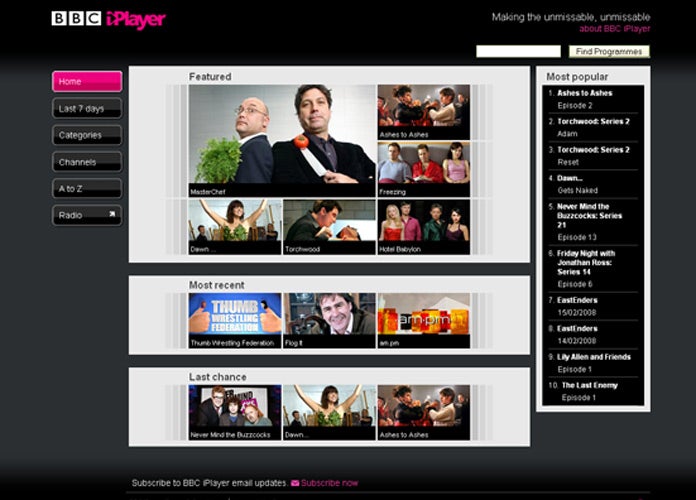Thomas Sutcliffe: It's on your iPod, but it's not telly

I took Keeley Hawes to bed the other day and, without wishing to be ungallant, the experience didn't entirely live up to my expectations. Her husband, Matthew Macfadyen, has no need to worry about this confession, incidentally, because Ms Hawes wasn't even with me in spirit. She was present in pixels only – in her role as DI Alex Drake in Ashes to Ashes. Having missed episode one of the new series, I thought I ought to catch up with it, but I was feeling a little under the weather at the time, so I took my laptop to bed and used the wireless connection to get through to the BBC's iPlayer website, which lets you catch up with the last seven days of broadcasts.
As I say, I wasn't quite sure about Ashes to Ashes – which struggled a little to justify another chronological clash of cultures – but I felt considerably warmer towards iPlayer by the time I'd finished. In fact, I liked it so much that I invited John Torode and Gregg Wallace, the presenters of Masterchef Goes Large, to take Keeley's place, so that I could catch up with one of their early heats.
I'd been a little sceptical – in theory – about iPlayer, mostly on grounds of the visual quality of the image, which is smaller than the average postcard. What I discovered – in practice – is that a postcard-sized image two feet away from your nose is, to all intents and purposes, much the same as a 42in screen on your bedroom wall. True, it's hardly HD and you can give up on the subtler nuances of cinematography, but when was that relevant to Masterchef – or 90 per cent of the BBC's output? The fact is that the laws of perspective have a wonderful way of evening out the competition between little screens and big ones – a trick that will presumably also come in handy now that the BBC has made some of its programmes available for purchase through the iTunes store, so that those with the cash and connections can carry programmes with them on iPods and iPhones.
There are some obvious practical drawbacks to the iTunes development. One is that the current offerings – Torchwood, Life on Mars, Little Britain, Catherine Tate, and so on – are not terribly exciting. As anyone with Freeview will already know, there seem to be digital channels that are dedicated solely to round-the-clock broadcasts of Little Britain and other popular strands. If you were in the market for these programmes it would be something of an achievement not to have seen them all already. And the pricing on the iTunes offer appears designed to discourage new customers, with the download of a complete series costing far more than the DVD equivalent available in any high street store. I would have thought there might be a market for the kind of one-off documentary or drama that is unlikely to be given a DVD release – £1.89 isn't a huge amount to pay to placate the sense of frustration that less assiduous television watchers get when one of the rare good ones escapes them. But for whatever reason, that kind of programme doesn't yet show up on the virtual shelves.
But here may be a more significant problem with all of these new forms of dissemination – one that has nothing to do with the size of the screen or the quality of the image, but which does concern the amount of space there is in front of the screen... and how many people can share it.
Nobody, I take it, is going to huddle around an iPod or a laptop for a spot of family viewing. With some broadcasts, this isn't going to matter a great deal. Some programmes are an inherently solitary experience, because you have to concentrate on their content. But a lot of television would be pretty near unendurable if you didn't have people sitting alongside you to help you through. And the odd thing is that these aren't necessarily the worst programmes, just those that recognise that television has always been partly a continuation of the music-hall tradition – that most democratically raucous form of entertainment. We have learnt to behave in the theatre and the art gallery, but we know that we are still at liberty to mock and jeer and gasp in front of the television – and it's one of the things we like most about it.
Even the Prime Minister – not a man you'd associate with vulgar pleasures – knows the satisfaction of consuming The X Factor in the company of his family. Until you can download that bit of the experience, there's an argument for saying you haven't downloaded the essence of television at all.
Join our commenting forum
Join thought-provoking conversations, follow other Independent readers and see their replies
Comments
Bookmark popover
Removed from bookmarks